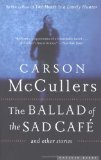The Ballad of the Sad Cafe is, in fact, sad. So sad it resonates with the sadness behind it: Carson McCullers must have been sad herself. It feels too personally acquainted with sad to have been fabricated; McCullers might have been a genius but I still think she didn’t entirely make this up.
McCullers tells a story of a doomed and miserable southern town, its misfits, and unrequited love. She has a tenderness for freaks–our protagonist, Miss Amelia, is a six-foot-two giantess who becomes hopeless obsessed with a warped hunchback. Miss Amelia is flint-spined, a bootlegging businesswoman with a ferocious streak, but, like the other characters in the story struck by love, is hopeless and floppy in the face of her beloved.
While the plot weaves its love triangle ways, the thrumming feeling of “there is no hope, there is no hope” runs beneath it. McCullers captures the stifling dullness of a southern small town but pins her characters to it like bugs under glass. Poor things.
This collection included several other short stories, most of which were riffs on love. Some were sensitive and lyrical: one touches on a wife’s alcoholism in suburbia, another the end of prodigy for a young girl. Others: slightly more forgettable.

